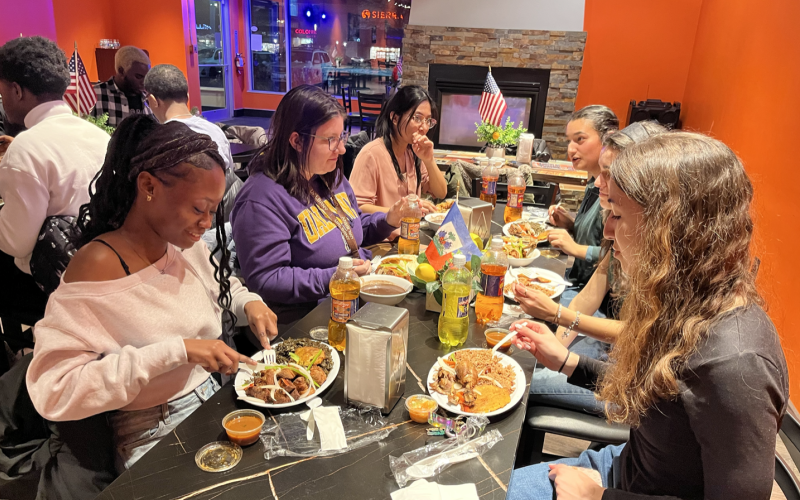Postcolonial Lab Project Gives UAlbany Students Taste of Local Haitian Cuisine

By Bethany Bump
ALBANY, N.Y. (March 11, 2025) — Parnel Boyer Jr. got a rare taste of home during a recent class outing to A.J.W. Caribbean Restaurant, a Colonie establishment specializing in Haitian fare.
It was a special moment for the UAlbany sophomore, who was born in Haiti and moved to Long Island with his family when he was 10. Haitian cuisine is not always easy to find in America outside the family home, Boyer explained. When he transferred to UAlbany this semester from St. John’s University in Queens, Boyer found himself further from home and the food that reminded him of it than ever before.
That’s why he was quick to agree when his French professor suggested he join the restaurant trip being organized as part of the Postcolonial Lab Project, an initiative of UAlbany’s Center for the Humanities, Arts and Technosciences and Humanities Labs Project, which aims to revive interest in the humanities with hands-on programming. The Feb. 13 trip, a collaboration between AFRE 399 Special Topics: Gourmet Culture of France and ASPN 205 Intermediate Spanish for Heritage Speakers, gave students a chance to explore identity, culture and colonization through the lens of food.
“It reminds me so much of home and my grandma and my mom,” said Boyer, as he enjoyed a plate of chicken stew with sweet plantains and black rice. “It’s a really maternal kind of community that we have. Every home, every restaurant you go to, you’re going to see that it’s all these strong women keeping the community alive. And I value that a lot.”
Boyer spent some time talking with the owner of the restaurant, Ermione Clement, a Haitian immigrant who shared her knowledge of Haitian cuisine with the group.
“I learned she’s very similar to every other Haitian restaurant owner, mother and auntie that I know,” he said. “They have the same values. They want to support the community by providing their all and doing all they can to make delicious food.”
The trip offered a unique opportunity for students to learn how colonization can influence food and culture.
Haiti, a Caribbean country that shares the island of Hispaniola with the Dominican Republic, was under Spanish and then French rule until the Haitian Revolution at the turn of the 19th century. Its cuisine has been heavily influenced by French and Spanish colonization, and the slave trade brought African imports and influence to the food as well.
French lecturer Véronique Martin and Spanish lecturer Dora Ramírez, who teach in the Department of Languages, Literatures & Cultures and spearheaded the trip to A.J.W. Restaurant, said the trip was also a chance for students to learn from each other.
Their students are largely second-generation immigrants hailing from places like Haiti, the Dominican Republic, Mali, Togo, Cameroon, Mexico, El Salvador, Colombia and Peru, and grew up hearing Spanish or French in the home.
“It's really interesting to have them in our classes because they can also talk about their culture of origin, some of the food that they have, and commonalities with the food we are discussing,” Martin said.
Alexsis Romaine, a sophomore political science major who is in Ramirez’s Spanish heritage class, explained how popular Haitian ingredients like plantains are common in Dominican cuisine, as well.
Romaine, who is half Dominican and half Trinidadian, said she was happy to experience food that reminded her so much of her family’s heritage, while also learning about other cultures along the way.
“My grandma was born in the Dominican Republic and my mom came here when she was born, so we’ve become more and more Americanized over the years,” she said. “Over time, my grandma didn’t really cook ethnic foods as much, so part of me taking this class has been trying to reconnect and reclaim my Dominican roots.”
For Boyer, it wasn’t just the food at A.J.W. Caribbean Restaurant that reminded him of home. It was the women preparing it, as well as the communal experience he got to enjoy with his fellow students.
“You see how we’re all sitting down here, everybody’s mingling? That would be dinner at my house,” he recalled. “The family would come. The neighbors would come. Any little excuse for a gathering we would take and it would be centered around food, because that’s how we kept the community alive.”
The Postcolonial Lab project, which is open to students across various humanities courses at UAlbany, will be hosting other events this semester, including some with a continued focus on food, identity and culture. On April 10, students will have an opportunity to hear directly from recipients and organizers of a program in Hudson, N.Y. that provides culturally appropriate meals to Latinx, Caribbean and Asian immigrant communities.







